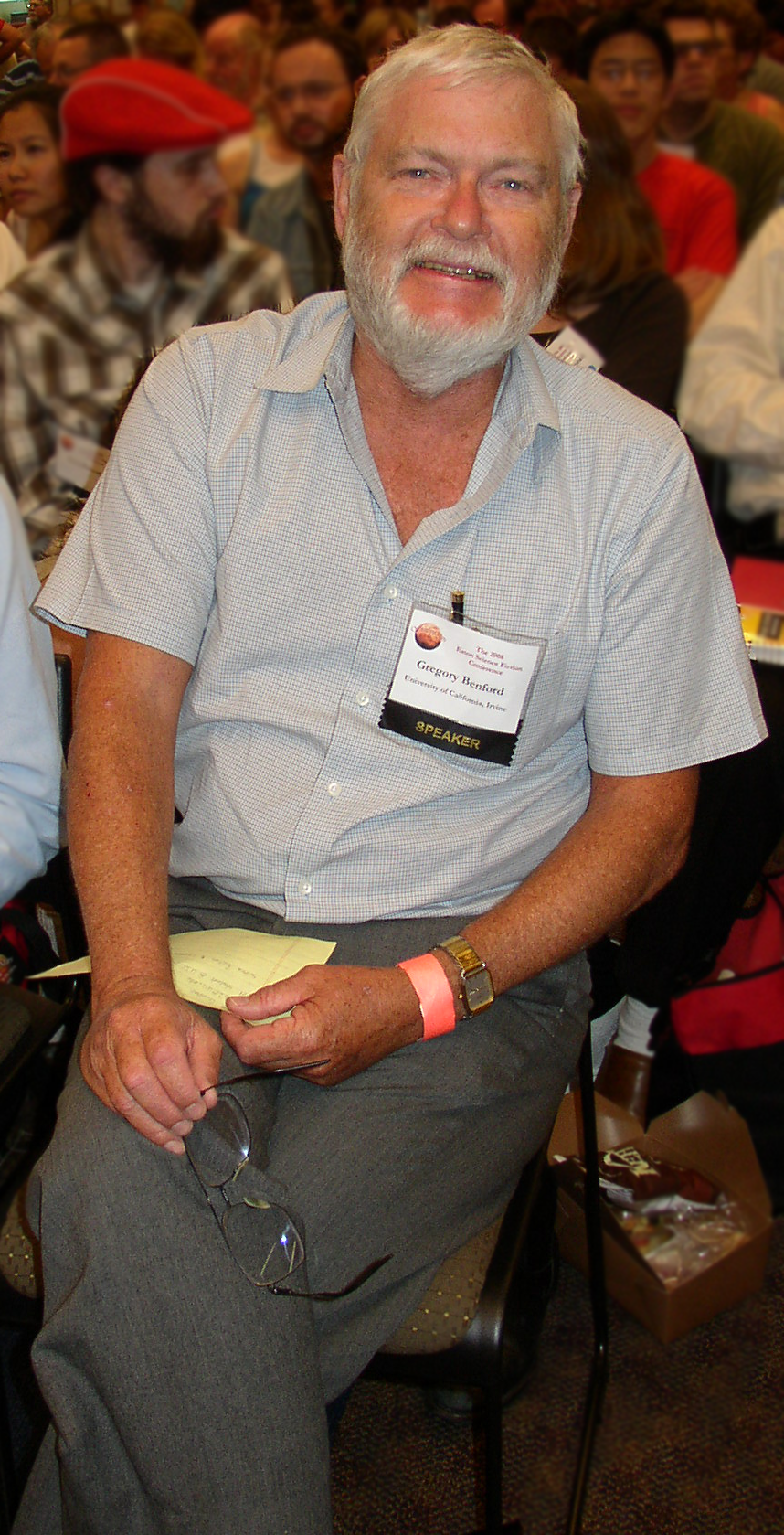„Любая технология, отличная от магии, является несовершенной.“
«Страхи Основания»
часть 3, глава 2 (парафраз 3-го закона Кларка)
Из произведений
Грегори Бенфорд — американский астрофизик и писатель-фантаст. Профессор кафедры физики и астрономии Калифорнийского университета в Ирвайне, где он преподает с 1971 года. Действительный член Американского физического общества. Редактор журнала Reason. Получил наибольшую известность как автор серии романов Galactic Center Saga. Имеет брата-близнеца Джеймса, который выступил соавтором нескольких рассказов. Публично поддерживает крионику. Wikipedia

„Любая технология, отличная от магии, является несовершенной.“
«Страхи Основания»
часть 3, глава 2 (парафраз 3-го закона Кларка)
Из произведений
SF is a controlled way to think and dream about the future. An integration of the mood and attitude of science (the objective universe) with the fears and hopes that spring from the unconscious. Anything that turns you and your social context <…> inside out. Nightmares and visions, always outlined by the barely possible.
Источник: James E. Gunn and Matthew Candelaria, Speculations on Speculation: Theories of Science Fiction, Scarecrow Press, 2005, p. 343. ISBN 0-8108-4902-X
His Marxism, which remained his only irrational faith throughout his life, told him that surely the United States could never be a positive influence.
предисловие к «Последним и первым людям», 1987
Источник: Foreword (1987) by Gregory Benford // Olaf Stapledon, Last and First Men (Series: SF Masterworks); London: Gollancz Books 1999, p. x.
Benford early established himself though his solo work as a leading writer of Hard SF, although much of his writing also has a lyrical aspect reminiscent of Poul Anderson, and his larger-scale tales have an almost impersonal sweep typical of the Scientific Romance epics of his younger contemporary Stephen Baxter,.. <…> Though his grasp of character sometimes falters, and complicated political/cultural arguments about the contemporary world are sometimes conveyed with excessive assurance, Benford's work continues to play formidable intellectual games with readers willing to think harder than normal...
Брайан Стэблфорд, Джон Клют, Энциклопедия научной фантастики, 2011
Источник: Benford, Gregory http://sf-encyclopedia.com/entry/benford_gregory // SFE: The Encyclopedia of Science Fiction, online edition, 2011—.
Part 2 “Aleph”, Chapter 3 (p. 68)
Against Infinity (1983)
““Free will again,” Cathy said.
“Or free won’t,” Peterson said mildly.”
Источник: Timescape (1980), Chapter 23 (p. 291)
“Just because something’s crazy, doesn’t mean it’s wrong.”
Part 5, Chapter 1 (p. 228)
Artifact (1985)
Part 5 “Coming Home”, Chapter 3 (p. 179)
Against Infinity (1983)
“Must admit it felt good. First time in years anybody ever admitted I was right.”
To the Storming Gulf, p. 142
In Alien Flesh (1986)
“Any technology that does not appear magical is insufficiently advanced.”
This is derived from the third of Arthur C. Clarke's three laws : "Any sufficiently advanced technology is indistinguishable from magic." There are other variants which had inverted this including one known as Gehm's corollary http://www-users.cs.york.ac.uk/susan/cyc/l/law.htm, published several years earlier : "Any technology distinguishable from magic is insufficiently advanced." The earliest variant seems to be "Any sufficiently advanced magic is indistinguishable from technology." It has been called "Niven's Law" and attributed to Larry Niven by some, and to Terry Pratchett by others, but without any citation of an original source in either case — the earliest occurrence yet located is an anonymous one in Keystone Folklore (1984) by the Pennsylvania Folklore Society.
Foundation's Fear (1997)
“There’s plenty—”
“Plenty is exactly what there’s none of.”
Part 2 “Aleph”, Chapter 6 (p. 87)
Against Infinity (1983)
Exposures, p. 244
In Alien Flesh (1986)
““The peers just fill the air with their speeches.”
“And from what I've seen, vice versa.””
Источник: Timescape (1980), Chapter 5 (p. 46)
“Thunder impresses, but it’s lightning does the work.”
Time’s Rub, p. 253 (Originally published in Asimov’s, April 1985)
In Alien Flesh (1986)
Part 6 “Aleph Null”, Chapter 4 (p. 226)
Against Infinity (1983)
“At least being prosperous set one apart in England; here it guaranteed nothing, not even taste.”
Источник: Timescape (1980), Chapter 11 (p. 134, concerning the USA)
“Modern economics and the welfare state borrowed heavily on the future.”
Источник: Timescape (1980), Chapter 43 (p. 445)
“There was something about such reflex stupidity that never failed to irritate him.”
Источник: Timescape (1980), Chapter 17 (p. 231)
Afterword to Exposures, p. 246
In Alien Flesh (1986)
“They will do anything for the worker, except become one.”
Источник: Timescape (1980), Chapter 5 (p. 46, concerning the peers)
“Maybe is not a theory, you know, it is merely maybe.”
Part 4, Chapter 6 (p. 203)
Artifact (1985)
Part 1 “Beyond Sidon”, Chapter 2 (p. 12)
Against Infinity (1983)